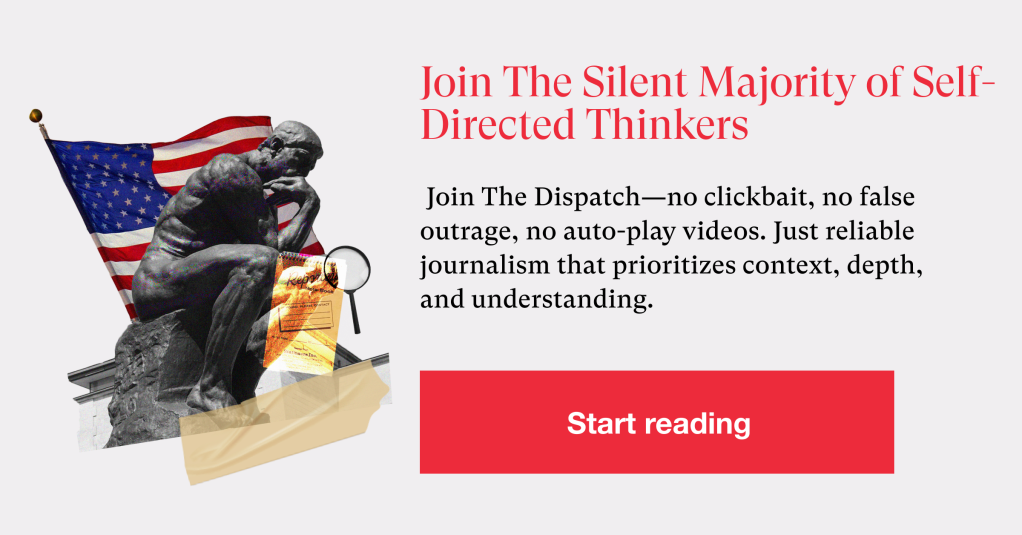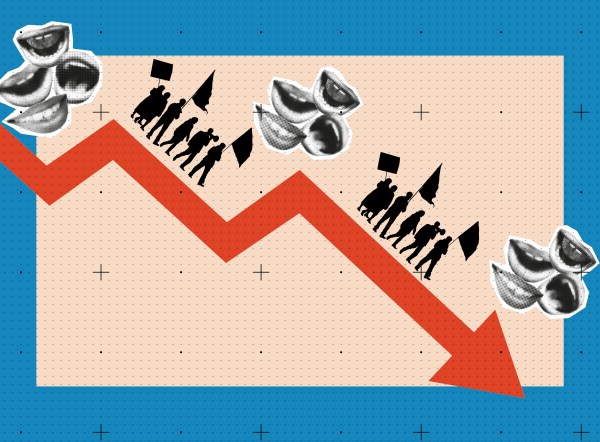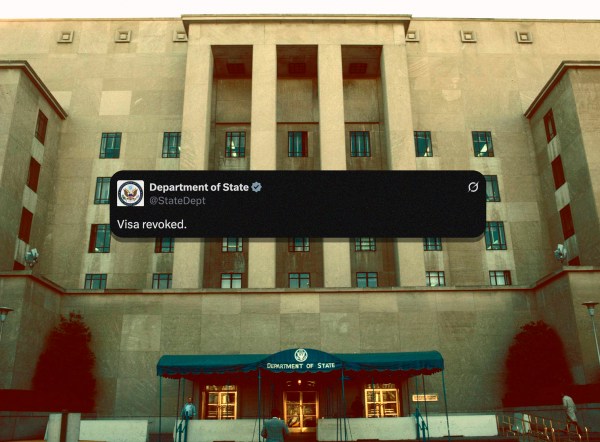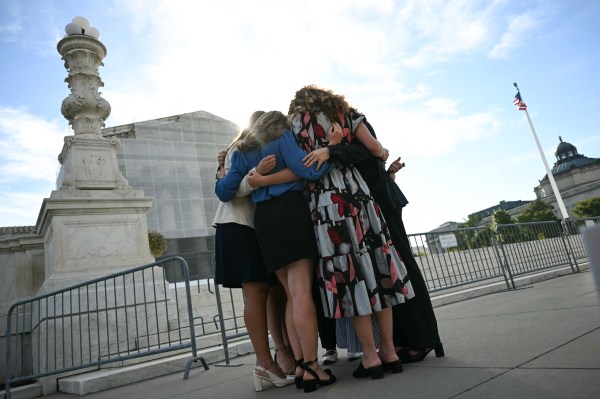Turn any article into a podcast. Upgrade now to start listening.
Premium Members can share articles with friends & family to bypass the paywall.
You read this newsletter for the pessimism, and I aim to please. So here’s my best pessimistic take on Disney standing up to the president and reinstating Jimmy Kimmel.
It’s going to convince many Americans that everything is basically fine when everything isn’t fine.
The White House bullying a late-night host off the air is the sort of news that will plausibly filter down even to those whom we delicately describe as “low-information voters.” Ask the average joe how they feel about Donald Trump jawboning major corporations or Ivy League universities or white-shoe law firms, and they’ll either look at you perplexed or shrug. When authoritarianism doesn’t affect them directly, they don’t much notice or care. Out of sight, out of mind.
Plus, let’s face it: It’s impossible to sympathize with Harvard (... says the Yale alumnus).
But when Donald Trump starts messing with the boob tube—er, I mean with free speech—Americans notice. That brings authoritarianism into their living rooms, turning it into something that’s being done to them rather than to others, and that’s a bridge too far. Kimmel’s restoration after less than a week off the air feels like false reassurance that We the People won’t be directly burdened by coercive postliberalism. Only those who “deserve it” will.
So everything is fine, you see. America is still America, where comedians get to make wisecracks about the president while he snatches every bit of federal power within arm’s reach and Congress applauds.
As a non-paying reader, you are receiving a truncated version of Boiling Frogs. You can read Nick's full newsletter by becoming a member here.
As much as I prefer to go full Eeyore, though, the truth is that there are encouraging aspects to l’affaire Kimmel. One is that the White House’s attempt to extort a major company in broad daylight did, in fact, fail. Maybe it failed because Disney’s management felt obliged to defend freedom of expression, or (more likely) maybe it failed because the company came to fear a consumer backlash more than it feared the president and his FCC toady. Either way, liberalism isn’t entirely licked yet.
It was encouraging for another reason. As Kimmel acknowledged in Tuesday night’s monologue, he had some influential right-wingers in his corner. “Maybe most of all, I want to thank the people who don’t support my show and what I believe, but support my right to share those beliefs anyway,” he said before naming Ben Shapiro, Candace Owens, and Sens. Mitch McConnell, Rand Paul—and Ted Cruz.
It’s true. Donald Trump’s chief congressional accomplice in the coup attempt of January 6 was the right’s most outspoken critic of his attempt to jawbone Disney. Cruz even used the same analogy I did last week to describe FCC Chairman Brendan Carr’s boorish ultimatum to have Kimmel taken off the air “the easy way or the hard way.” It’s something you might hear in Goodfellas, the senator said with righteous contempt: “That’s right out of a mafioso coming into a bar going, ‘Nice bar you have here. It’d be a shame if something happened to it.’”
Indeed. The last time I heard him criticize the president or his henchmen so frankly was in the spring of 2016. What’s gotten into him?
I think Jonathan Martin had it right today in Politico. Cruz knows that war is coming to his party, and he’s preparing for it, as are a lot of other people on the right.
Bad bets.
Ted Cruz always has a plan. His plans tend not to work, but not for lack of strategic deliberation.
Clearly, his plan upon joining the Senate in 2013 was to get elected president by distinguishing himself as the most uncompromising conservative in government. Then, as now, the grassroots right demanded “fighters” and Cruz believed he could consolidate their votes in the next Republican primary by branding himself as the rootin-est, tootin-est fighter in the party. Ringleading a doomed effort to defund Obamacare by shutting down the government was the pillar of that strategy.
His plan failed, but it succeeded well enough to make him the runner-up for the GOP nomination in 2016. He might well have won if not for the surprise entry into the race of la grande orange.
Once Trump jumped into the primary and zoomed to a lead in the polls, Cruz hatched another plan. He praised his new populist rival lavishly, seeing it as a chance to burnish his own populist credentials ahead of Trump’s inevitable collapse. Cruz bet that grassroots Republicans would sour on the frontrunner as it became clearer that Trump didn’t believe in smaller government or traditional values. Once they did, the senator would inherit their votes as the next-best populist alternative in the race.
That plan didn’t work out either.
After Trump knocked him out and became the presumptive nominee, Cruz concocted a third plan. The GOP’s large conservative majority would never fully reconcile itself to the new guy, he seemed to believe. By standing on principle at that year’s Republican convention and refusing to endorse the nominee, the senator set himself up for what looked like a no-lose proposition. Either Trump would lose the general election to Hillary Clinton, giving Cruz a chance in 2020 to say that only a staunch conservative can win, or Trump would win the general election and Cruz would end up as the de facto leader of the party’s dominant conservative faction, a sort of prime minister of the right.
That also didn’t turn out so hot for him. By October, he was so desperate to repair relations with Trump that he was phone-banking for him, producing one of the more humiliating photos in American political history.
The common mistake in all three plans was Cruz assuming that populist conservatives care about conservatism, or at least care more about it than they do about populism. He learned the truth the hard way, repeatedly. And he learned it well enough that, by January 2021, he was no longer willing to take sides against Trump by defending basic conservative beliefs like “seizing power after losing an election is wrong.”
That was the one plan that worked out for him, I think. He wagered that his political standing among the loathsome postliberal right would implode if he opposed the coup plot, and he was surely correct.
Now here he is, seemingly unlearning the lesson of 2021 by condemning the jawboning of ABC and Jimmy Kimmel. And for a familiar reason, as Jonathan Martin sees it: Yet again, as in 2016, Cruz appears to be gambling that Republican voters will eventually choose conservatism over feral populism—once Donald Trump is removed from the political equation.
It’s clear the 54-year-old Texan is wagering that at some future date, when he’s still young enough to run for president again, his party will drift back to its free market and free speech moorings. I know Cruz well enough to hear him saying it on the stump at some future Pizza Ranch stop: Look, folks, I think Trump did a lot of good and his critics never gave him a fair shot, but I stood up for our conservative values when it wasn’t totally popular in our party.
Ted Cruz always has a plan. When he complains about the Trump White House acting like hoodlums or criticizes the president for his tariff insanity, he’s jockeying for position in 2028 as the guy who didn’t abandon Reaganism entirely and betting that there’ll be a constituency on the right for a candidate like that.
But why is he implementing his plan now? The president has more than three years left in his term. J.D. Vance is a runaway frontrunner in early 2028 polling. The earlier Cruz leaps to distance himself from Trumpism, the greater the risk that he’ll make an enemy of the White House and have to come crawling back to salvage his political career like he did in 2016.
Frankly, I think he’s getting freaked out. And he’s not the only one who is.
The schism.
On Monday, radio host Mark Levin, a longtime Cruz ally, posted an ideological call to arms. “I’m gearing up for a massive political battle in 2028 within the GOP,” he declared. “We will see who turns out the most votes and who builds the strongest coalitions. And then there’s the general election, which cannot be won without us.”
So-called constitutional conservatives have “had enough of the grifters and neo-Nazis, the Marxists and Islamists, and their patsies and lapdogs in the media and politics,” he continued. “They don’t represent we, the people. They’re destroying our country. They reject Trump, Reagan, and our founding. And we reject them.” He didn’t name names but he didn’t need to. He and Cruz have been sparring for months with Tucker Carlson (or “Qatarlson,” as Levin calls him) over Tucker’s hostility to Israel and platforming of Jew-baiters.
Charlie Kirk’s murder brought that dispute to a head. In his speech at Sunday’s memorial service, Carlson referred to certain unnamed hummus-eaters who plotted against Jesus; Levin called him on it and exhorted influential right-wingers to condemn it. Meanwhile, Carlson and Candace Owens have alleged that Kirk had privately soured on Benjamin Netanyahu and the war in Gaza before his death and was warned by right-wing donors to keep quiet about it—a claim that incensed Cruz.
“I’m getting really tired of Tucker & his cronies falsely claiming ‘Charlie agreed with me that Israel is terrible & the problem in America is all the damn Jews,’” he wrote recently. “I knew Charlie well & indeed the very last conversation we had was how deeply concerned he was about the rising, toxic wave of antisemitism on the right.”
Watching the postliberal right mobilize to present itself as the rightful heir to the martyred Kirk’s legacy may have driven home a few frightening realities to Reaganites like Cruz and Levin.
One: Their opponents aren’t fringe. Carlson, Owens, Steve Bannon, and uber-groyper Nick Fuentes have millions of followers among them. Carlson, as noted, is esteemed enough to have been invited to speak at Kirk’s funeral. “Fundamentalist MAGA” can and will mount a serious effort to steer the GOP in its direction after Trump is gone.
Two: Republican voters may be more receptive to that direction than we think. The GOP will remain solidly behind Israel as long as the president does, no doubt, but opinion is moving beneath the surface. A Pew Research poll taken in March found 50 percent of Republicans ages 18-49 now have an unfavorable view of the Jewish state, up from 35 percent in 2022. (Just 23 percent of GOPers aged 50 and older have an unfavorable view.) You don’t need to look hard to find young right-wingers willing to say things like, “To be ‘America First,’ the Stars and Stripes must come before the Star of David.”
Three: The differences between Reaganites and postliberals cannot be reconciled. They’ve been papered over since 2016 in the name of loyalty to Trump, but they’re going to break wide open when his departure from politics creates a power vacuum at the top of the party. And not just on Israel—on everything from tariffs to Russia to whether the government should act like greasy hoodlums in shaking down late-night comedians. The GOP will never again be the party of Reagan, but the 2028 debate will determine whether it’s more recognizably Reagan-esque than the scummy ethnonationalist Euro-fascism to which postliberals aspire.
If Cruz is moving early to engage in that debate, it may be because he’s genuinely alarmed by what his party’s base is being conditioned to support and thinks there’s no time to lose in heading it off. You don’t need to hold him in high regard (and shouldn’t) to believe that, while coup attempts may not bother his conscience, antisemitism and crackdowns on free speech properly do.
And while I’d never be so optimistic as to tell you that Reaganites will win the coming war, I can understand why Cruz thinks they could—and why his latest plan to lead the fight will, he thinks, be good for him politically.
The plan.
For starters, he must realize by now that he’s never going to outpopulist the postliberals. His only chance at being a major Republican player after Trump is to reestablish his conservative ideological identity and hope that the base moves in his direction.
And it’s not unthinkable that it might. The right’s commitment to nationalism in 2028 may prove as shallow as its commitment to conservatism was in 2016 once there’s no charismatic celebrity demagogue to rally around. More to the point, Carlson and Bannon are considerably more unsavory in their politics than even Trump is; neither can win a primary if their base ends up consisting mostly of groypers. And conservatives will have a solid electability argument against them: Do we really think that a more explicitly ethnonationalist GOP will hold onto the black and Hispanic converts that the president won last November?
Cruz might also be calculating that there’s a lot of pent-up dissatisfaction with Trumpism on the right that will come flooding out once the GOP’s political fortunes no longer depend on defending the president. That’s especially so if his protectionist policies end up running the economy into a ditch. Nothing will rekindle respect for Reaganism like watching the dumbest trade war in history plunge America into stagflation.
But even if the economy holds up, some of Trump’s authoritarian excesses are destined to be renounced in hindsight by many Republicans who put up with them for the moment as the unfortunate price of having a “fighter” in charge. One of the few times I’ve seen a MAGA relative flash real disgust at the president’s antics was when Trump threatened “serious consequences” for Elon Musk if Musk exercised his right to donate to Democrats. Not all of his fans take political persecution by the government lightly, as we were reminded this past week.
Cruz may expect that impulse to reassert itself en masse within the GOP in the post-Trump era: He went too far, some Republicans will finally admit. The senator is signaling bright and early to those voters that he agrees.
In short, he may be rebooting the plans that he tried to execute in 2016. Perhaps the lessons of hard experience will lead Republican voters to choose conservatism over authoritarianism the next time the two face off in a primary. But even if they don’t, Cruz’s renewed conservative advocacy could boost his influence in the party: Either a postliberal nominee will lose the next general election, giving the senator a chance to say “I told you so” in 2032, or the nominee will win and feel obliged to meet some of the demands of Reaganites like Cruz in order to hold the GOP’s fragile coalition together.
Because if that nominee refuses, Reaganites are going to make good on Mark Levin’s threat and bolt the party, right?
Well, no. I’m afraid that, as a sentient being who’s been conscious for the past 10 years, I don’t believe that.
I can believe that a committed ideologue like Levin might boycott the 2028 general election if the Republican nominee is a postliberal whom he disdains and who’s unwilling to accommodate him on issues about which he’s passionate, like an ongoing alliance with Israel. But the average Reaganite voter? Please. The deathless logic of partisan conservatism will prevail, as it always does: The best Democratic president will be worse on the issues that I care about than the worst Republican.
It ain’t true, but truth has nothing to do with American politics anymore.
If anyone’s likely to boycott a general election over the nominee not being to their liking, it’s the Tuckerites. It’s simple “horseshoe theory” at work. If your top policy priorities are ending aid to the Jewish state, boosting redistribution to the working class, and normalizing protectionism in economic policy, you’re better off with a progressive as president than with Ted Cruz. You’ll do better with fascist recruitment too, as nothing will radicalize the right like suffering under the abuses of a far-left administration.
The whole reason Cruz and Levin are in the position they’re in today is because much of the right has decided that the constitutional order is an impediment to American “greatness,” not the source of it. If you think that’s likely to change by 2028, you’re an optimist. As we’ve established, I am not.








Please note that we at The Dispatch hold ourselves, our work, and our commenters to a higher standard than other places on the internet. We welcome comments that foster genuine debate or discussion—including comments critical of us or our work—but responses that include ad hominem attacks on fellow Dispatch members or are intended to stoke fear and anger may be moderated.
With your membership, you only have the ability to comment on The Morning Dispatch articles. Consider upgrading to join the conversation everywhere.